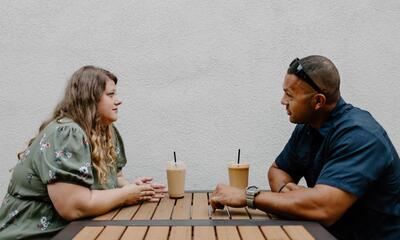A Different Kind of New Year's Resolution

It’s time for a new year!
What is the difference between being nice and being kind?
I have recently been reading a book by Dr. Mark Baker entitled Overcoming Shame: Let Go of Others’ Expectations and Embrace God’s Acceptance. He makes a distinction between being nice in relationships and being kind. This distinction is intriguing, and seeking to be kind rather than just nice has some definite advantages.
We are often nice because we are afraid of hurting other people’s feelings. We will go out of our way not to offend them. When we function this way, we frequently sacrifice our own honesty, feelings, and opinions....We are trying to keep others happy at our own expense and out of our own fear.
We are often nice because we are afraid of hurting other people’s feelings. We will go out of our way not to offend them. When we function this way, we frequently sacrifice our own honesty, feelings, and opinions. Being nice is good, but often it is not authentic. When we are just being nice, we can deny our own feelings, wants, and needs in order to accommodate and please others. When we do that, we are not being very honest with them or with ourselves. We are trying to keep others happy at our own expense and out of our own fear. Fear is the motivator, not love, care, or concern. We are afraid that if we are honest and real, we might offend the other and be rejected. Furthermore, others can tell when we function this way. They can sense when we are being inauthentic, even if they aren’t exactly sure what they are sensing. As a result, they may not feel comfortable in their relationship with us even though we are working very hard on the relationship.
Kindness, however, is different. Kindness does not require that you sacrifice your thoughts, feelings, or opinions in order to appease others. Kindness is not weakness; kindness requires confidence. Baker says, “Being kind means considering the feelings of others while remaining honest about how you feel at the same time. Being kind might mean setting aside your feelings out of compassion for the feelings of others, and choosing to put their needs ahead of yours if the situation calls for it. But to be truly kind, you have to be able to be honest, at least with yourself” (p.67). Kindness means that I know what I think, feel, need, and want, and I also desire to know what the other person thinks, feels, needs, and wants. Being kind means that I am authentic in how I care for others; I recognize what I might want or need, and am willing to share those needs and wants with the other person. However, out of kindness, I am willing to set those needs and wants aside for the good of the other. In being kind, I am motivated not by fear, but by love and care. I am not worried about being rejected; I am concerned about the wellbeing of the other. Kindness also means that I do appropriately tend to my own feelings, thoughts, needs, and wants. I do so in order to be emotionally healthy so that I can continue to be kind to others.
In being kind, I am motivated not by fear, but by love and care. I am not worried about being rejected; I am concerned about the wellbeing of the other.
Being kind is important for relational health. It is good for our own emotional health, for the relational health of others, and for our relationships. Furthermore, not only do these benefits result, but given the state of our society and political culture right now, I believe that we could all benefit from cultivating a little more kindness.
A new year is a good time to reflect on the changes that we want to make in our lives and in our relationships. I hope that the new year is a year of kindness for you


